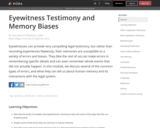
Text and links to all ancillary materials for Module 17
- Subject:
- Psychology
- Social and Behavioral Sciences
- Material Type:
- Module
- Reading
- Teaching/Learning Strategy
- Author:
- Cara Laney
- Elizabeth F
- Date Added:
- 05/31/2021

Text and links to all ancillary materials for Module 17
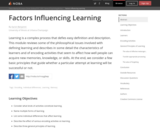
Text and links to all ancillary materials for Module 16
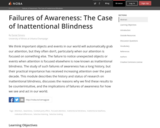
We think important objects and events in our world will automatically grab our attention, but they often don’t, particularly when our attention is focused on something else. The failure to notice unexpected objects or events when attention is focused elsewhere is now known as inattentional blindness. The study of such failures of awareness has a long history, but their practical importance has received increasing attention over the past decade. This module describes the history and status of research on inattentional blindness, discusses the reasons why we find these results to be counterintuitive, and the implications of failures of awareness for how we see and act in our world.
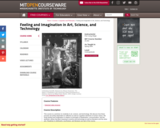
Seminar on the creativity in art, science, and technology. Discussion of how these pursuits are jointly dependent on affective as well as cognitive elements in human nature. Feeling and imagination studied in relation to principles of idealization, consummation, and the aesthetic values that give meaning to science and technology as well as literature and the other arts. Readings in philosophy, psychology, and literature.

Final project examples intended to illustrate the integrative nature of the course, provide objective evidence of their understanding of learning outcomes of PSYC 2301, and apply objective and subjective information from the entire course to scientific research.
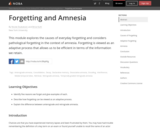
Text and links to all ancillary materials for Module 15
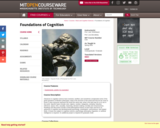
Advances in cognitive science have resolved, clarified, and sometimes complicated some of the great questions of Western philosophy: what is the structure of the world and how do we come to know it; does everyone represent the world the same way; what is the best way for us to act in the world. Specific topics include color, objects, number, categories, similarity, inductive inference, space, time, causality, reasoning, decision-making, morality and consciousness. Readings and discussion include a brief philosophical history of each topic and focus on advances in cognitive and developmental psychology, computation, neuroscience, and related fields. At least one subject in cognitive science, psychology, philosophy, linguistics, or artificial intelligence is required. An additional project is required for graduate credit.

" This team-taught multidisciplinary course provides information relevant to the conduct and interpretation of human brain mapping studies. It begins with in-depth coverage of the physics of image formation, mechanisms of image contrast, and the physiological basis for image signals. Parenchymal and cerebrovascular neuroanatomy and application of sophisticated structural analysis algorithms for segmentation and registration of functional data are discussed. Additional topics include: fMRI experimental design including block design, event related and exploratory data analysis methods, and building and applying statistical models for fMRI data; and human subject issues including informed consent, institutional review board requirements and safety in the high field environment. Additional Faculty Div Bolar Dr. Bradford Dickerson Dr. John Gabrieli Dr. Doug Greve Dr. Karl Helmer Dr. Dara Manoach Dr. Jason Mitchell Dr. Christopher Moore Dr. Vitaly Napadow Dr. Jon Polimeni Dr. Sonia Pujol Dr. Bruce Rosen Dr. Mert Sabuncu Dr. David Salat Dr. Robert Savoy Dr. David Somers Dr. A. Gregory Sorensen Dr. Christina Triantafyllou Dr. Wim Vanduffel Dr. Mark Vangel Dr. Lawrence Wald Dr. Susan Whitfield-Gabrieli Dr. Anastasia Yendiki "
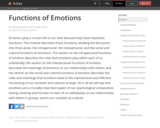
Emotions play a crucial role in our lives because they have important functions. This module describes those functions, dividing the discussion into three areas: the intrapersonal, the interpersonal, and the social and cultural functions of emotions. The section on the intrapersonal functions of emotion describes the roles that emotions play within each of us individually; the section on the interpersonal functions of emotion describes the meanings of emotions to our relationships with others; and the section on the social and cultural functions of emotion describes the roles and meanings that emotions have to the maintenance and effective functioning of our societies and cultures at large. All in all we will see that emotions are a crucially important aspect of our psychological composition, having meaning and function to each of us individually, to our relationships with others in groups, and to our societies as a whole.
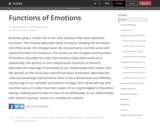
Text and links to all ancillary materials for Module 31
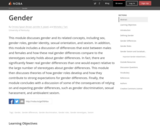
This module discusses gender and its related concepts, including sex, gender roles, gender identity, sexual orientation, and sexism. In addition, this module includes a discussion of differences that exist between males and females and how these real gender differences compare to the stereotypes society holds about gender differences. In fact, there are significantly fewer real gender differences than one would expect relative to the large number of stereotypes about gender differences. This module then discusses theories of how gender roles develop and how they contribute to strong expectations for gender differences. Finally, the module concludes with a discussion of some of the consequences of relying on and expecting gender differences, such as gender discrimination, sexual harassment, and ambivalent sexism.
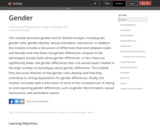
Text and links to all ancillary materials for Module 10

General Psychology Textbook.

This is the full course content for a course on General Psychology. It contains eight modules: Foundations of Psychology; Biopsychology; Consciousness and Sleep; Sensation and Perception; Learning, Memory, and Intelligence; Motivation and Emotion; Personality, Developmental Psychology, and Social Psychology; Psychological Disorder and Treatment, Abnormal Behavior and Health Psychology

The NOBA Project is a growing collection of expert-authored, open-licensed modules in psychology, funded by the Diener Education Fund. From these open modules, Tori Kearns and Deborah Lee created an arranged open textbook for her introductory psychology class. This textbook was created under a Round One ALG Textbook Transformation Grant.

Emphasis will be placed upon application of psychological knowledge to daily situations, and upon accessing and assessing information from a variety of sources about behavior. Skills in scientific reasoning and critical thinking will be developed during this course. Areas of psychology to be included are: research methods, neuroscience, human development, perception, consciousness, learning, memory, intelligence, motivation, emotion, personality, psychological disorders, psychotherapy, stress and health, and social psychology.Login: guest_oclPassword: ocl

Deals with the specific functions of neurons, the interactions of neurons in development, and the organization of neuronal ensembles to produce behavior, by functional analysis of mutations and molecular analysis of their genes. Concentrates on work with nematodes, fruit flies, mice, and humans.

A learning module for import to LMS on the social psychology of stereotypes, racial bias, and biased policing. Also available as a standalone module on the Blackboard Coursesites platform.
From the assignment's preamble:
Largely because of the horrific videorecorded murder of George Floyd while under the restraint of four Minneapolis police officers, citizens around the world are feeling a renewed urgency to take action to recognize and act against racism. This Teach-In is designed to give you an opportunity to learn a bit more about the psychology of stereotyping, prejudice and discrimination, the racial inequities and inequalities that exist in society and in policing, your own biases, and about the societies and organizations working to remedy these inequalities and inequities.
Here is briefly what the Teach-In involves:
Reading: You will read part of a social psychology textbook on social categorization and stereotyping, and two relatively short and approachable academic journal articles.
Watching: You will watch several brief TED-type lecture talks about the topic, and a debate on the topic "Policing is Racially Biased," presenting informed arguments both in favor of that idea and against it.
Doing: You will experience how psychologists measure one aspect of bias -- implicit bias.
Writing: You will write two short reflection-style papers, and write journal entries about your feelings and experience.
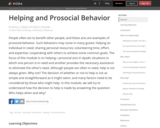
Text and links to all ancillary materials for Module 52

Open textbook on abnormal psychology. Includes sections on personality disorders, mood disorders, anxiety, schizophrenia, psychopathy, behavioral disorders, autism and disassociative disorders.